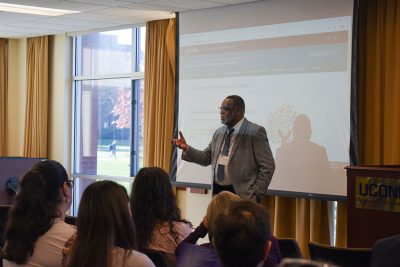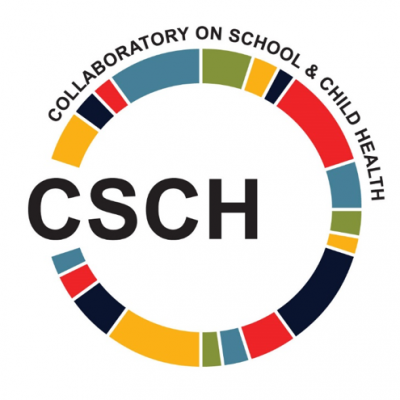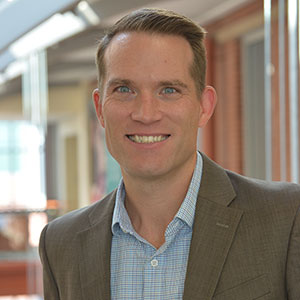Hartford Courant (Student Kayla Cole pens op-ed)
U.S. Secretary of Education Announces Recipients of the 2019 Terrel H. Bell Awards for Outstanding School Leadership
U.S. Department of Education (Neag School alumnus Daniel Crispino is being honored for outstanding school leadership)
Increase Student Learning in Only 3 Seconds
Faculty Focus (Adjunct faculty member Jennifer Sullivan writes commentary)
AUDIO: Top of Mind With Julie Rose
BYU Radio (Devin Kearns interviewed)
CSCH Co-Hosts Second Symposium on Trauma-Informed School Mental Health

Approximately 70 school, behavioral health, community, and research leaders from across the state gathered at the University of Connecticut campus in Storrs on Wednesday, Oct. 23, 2019, to discuss school and community responses to childhood trauma and how to align work around trauma-informed schools in Connecticut.
The event, “Symposium on Trauma–Informed School Mental Health 2.0,” was the result of collaboration between the University of Connecticut Collaboratory on School and Child Health, the Ana Grace Project, Capitol Region Education Council, the Child Health Development Institute, Clifford Beers Clinic, the state Department of Children and Families, the state Department of Education, and the University of Connecticut Neag School of Education. The symposium’s main goal was to continue conversations about broadening and aligning work around trauma-informed schools in Connecticut, moving forward the work of the Connecticut Trauma-Informed School Mental Health Task Force, a group that was formed after the original symposium in May 2017.
“In Connecticut, we have a lot to be proud of. But there is still a lot of work to do. We can’t rest on our laurels. When we talk about trauma–informed care, let’s make sure we’re talking about all kids.”
— Michael Williams, DCF Deputy Commissioner
Opening remarks were provided by Nelba Marquez-Greene of the Ana Grace Project, who charged participants with the question: “Who will you give a voice to, and how will you do this with integrity?” Jeana Bracey from the Child Health and Development Institute and Tim Marshall of the Connecticut Department of Children and Families, members of the Task Force steering committee, then hosted a kick-off discussion and DCF Deputy Commissioner Michael Williams offered comments to encourage forward movement. “In Connecticut, we have a lot to be proud of,” he began. “But there is still a lot of work to do. We can’t rest on our laurels. When we talk about trauma–informed care, let’s make sure we’re talking about all kids.”
Attendees broke into facilitated discussion groups to focus on prevention through screening/early identification; enhancing services to meet intensive needs; aligning policies and practices to facilitate sustainability; and building collaborations across public-private partnerships. Group facilitators were charged with establishing questions to discuss challenges, opportunities, and actions relevant to the topic area. John Frassinelli, Bureau Chief of the Health, Nutrition, & Family Services Bureau at the Connecticut State Department of Education, shared that sustainability requires thinking about strategies rather than programs, and that school leaders must ask “what is the problem that this is trying to solve?” when considering something new.
The groups later reconvened to summarize the big ideas. Participants put forward ideas such as embracing focus on core values (e.g. healthy relationships) over specific programs, the creation of a road map and state consensus on mental health screening in schools, a state-level shift on how to define child success that is consistent across districts, the importance of supporting social-emotional needs of staff, and the importance of engaging families and the community in addressing childhood trauma.
Jeana Bracey, Associate Vice President for School and Community Initiatives at the Child Health and Development Institute, and Sandra Chafouleas, Board of Trustees Distinguished Professor in the Neag School and Co-Director of the UConn Collaboratory on School and Child Health, are co-chairs of the Connecticut Trauma-Informed School Mental Health Task Force. They reflected on the energy of participants from across sectors who were excited to come together to tackle issues around supporting schools in sustained implementation of trauma-informed policies and practices that meet diverse needs. “The first symposium in 2017 focused on increasing awareness of childhood trauma and started to talk about how to address it as a state,” said Bracey, “Last time, we focused on talking about it, on thinking about it. This time we are focused on getting it done.” Chafouleas echoed the energy around action, noting participant “commitment to whole child well-being and agreement around healthy relationships are a critical foundation.”
Second Symposium on Childhood Trauma, Mental Health
Collaboratory on School and Child Health (Co-chaired by Sandra Chafoules, CSCH co-hosted symposium on trauma-informed school mental health)
There’s More to College Prep Than Academics
Education Week (Clewiston Challenger pens an original commentary about school counseling and college readiness)
What’s Missing in Efforts to Curb Heavy Drinking, Hazing on Campuses
Editor’s Note: The following op-ed, authored by visiting assistant professor Adam McCready, was originally published in The Conversation and republished in UConn Today.

Maxwell Gruver had been a student at Louisiana State University for only a few weeks in 2017 before he died of alcohol poisoning in a fraternity house hazing ritual known as “Bible study.” He and other pledges were made to chug 190-proof alcohol called Diesel for not knowing how to recite the Greek alphabet or certain facts about the Phi Delta Theta fraternity.
Phi Delta Theta was ultimately banned from LSU, joining a list of several other fraternities banned at the school over the past few decades after hazing incidents. These incidents include the 1997 death of Ben Wynne, who died after a night of heavy drinking with fraternity brothers on a pledge night.
In October 2019, officials at Ohio University suspended all 15 fraternities on campus after allegations that at least seven of them were involved in hazing.
Fraternity initiations provide a rite of passage into manhood for some college men. Some young men engage in risky behaviors such as drinking in excess to prove their manhood and gain acceptance from other men.
Hazing and heavy drinking have been taking place at American colleges and universities for decades. Death has been a constant companion. New fraternity members at U.S. colleges and universities have died at an average rate of one per year for the past 50 years. Ten have died in the past three years. At least six hazing deaths since 2017 were alcohol-related.
Drinking and hazing on campus have led to lawsuits, criminal charges, and stricter hazing laws. However, an analysis of much of the research on these punitive measures shows they have done little to change the behavior of fraternity men.
As a researcher who has examined masculinity in college fraternities, I conclude that the reason these efforts have not succeeded is because they fail to deal with the fact that drinking alcohol – and other risky behaviors – are deeply embedded in society’s notions about what it means to be a man.

Risky rites of passage
Fraternity initiations provide a rite of passage into manhood for some college men. Some young men engage in risky behaviors such as drinking in excess to prove their manhood and gain acceptance from other men.
Numerous studies have found that commonly-held ideas associated with masculinity, such as risk-taking, competition and violence – things sometimes espoused by fraternities – are linked to worrisome behavior and beliefs. This may also include getting drunk and the viewing of women as lesser “objects.”
Historically white college fraternities, which have helped define manhood on campuses for almost two centuries, help shape college drinking culture. Members of fraternities have been found to binge drink more than peers who don’t belong to fraternities, and privileged fraternity men have been found to drink more than their less privileged peers.
This leads me to the conclusion that attacking the problem of drinking necessitates dismantling the idea that drinking is part of what makes one a man.
Fraternally drinking
My own research used a survey to collect data from over 2,500 members of a fraternity with chapters at more than 70 U.S. colleges and universities. I found that members were more likely to drink at fraternity chapters with homophobic cultures.
This finding indicates fraternity men drink at least in part to prove they are not gay, and thus are real men, when they are with peers who want to be identified as heterosexual. Of course, this is just one of many reasons why young men drink.
As other scholars have found, alcohol use affords fraternity men the chance to engage in behaviors perceived to be feminine, such as showing emotion or developing relationships with other men, without having their manhood called into question. Alcohol use, in my view, provides fraternity men with a way to prove their masculinity and at the same time escape it.
Rethinking manhood
What does this mean for those who hope to address problematic behaviors, such as excessive alcohol use on campus?
First, addressing how fraternities view manhood may be an effective way to get individual members to behave more responsibly. Whether dealing with fraternities as a whole or individual members, interventions, such as campaigns to set new social norms, should aim to reduce fear and anxieties that prevent men from being themselves, particularly around their sexual identity. Efforts should be made to challenge what it means to be a fraternity man.
Research indicates that marketing campaigns targeted toward men can change their attitudes and behaviors about sexual violence. Like the 2014 NO MORE campaign against domestic violence and sexual assault that featured prominent NFL players, campus leaders could design campaigns that feature fraternity men denouncing homophobia and misogyny.
Like other programs that help college men explore manhood, forums could be convened to help fraternity men develop meaningful, deep relationships with one another without alcohol, or having their manhood called into question. These forums may strengthen relationships among fraternity men and reduce their alcohol use.
Since my study shows that drinking and ideas about manhood vary from one fraternity to another, “one size fits all” approaches – such as community-wide fraternity bans and prohibitions – are unlikely to change the behaviors of fraternity men. In my view, it will require individual or organization-specific interventions. That, it seems to me, will be more likely to curb problematic alcohol use before another death, injury or sexual assault occurs.
Here’s What’s Missing in Efforts to Curb Heavy Drinking and Hazing on Campus
The Conversation (Adam McCready writes an original commentary on masculinity and drinking problems in college fraternities)
Only One Woman on a List of America’s Most Innovative Leaders? Really?
Hartford Courant (Gina Barreca and Sally Reis on innovative leaders and creativity in America)
